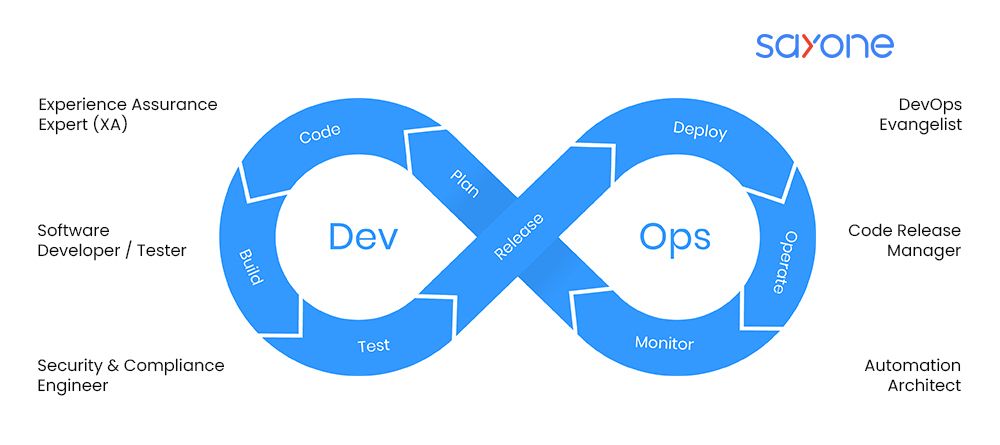
Subscribe to our Blog
We're committed to your privacy. SayOne uses the information you provide to us to contact you about our relevant content, products, and services. check out our privacy policy.

Hari KrishnaSeptember 18, 20238 min read

Generating table of contents...
DevOps is a collaborative approach bridging the traditional gap between software development (Dev) and IT operations (Ops). It aims to accelerate the delivery of software, ensuring faster releases, better quality, and improved responsiveness to business needs.
For businesses, adopting DevOps means getting ahead of the competition. With swift releases, reduced downtimes, and continually improving products, firms can meet ever-evolving customer demands and ensure business growth.
Building a DevOps team has become a necessity for modern firms. In an era where technology drives success, a DevOps team ensures streamlined operations, offering the synergy of development and IT operations. This collaboration reduces deployment times, minimizes errors, and boosts product quality.
A dedicated DevOps team brings together a variety of experts, from developers to infrastructure architects, focusing on a unified goal: delivering superior products faster to meet customer demands. Their combined expertise allows for quicker troubleshooting, ensuring minimal downtime and fostering a culture of continuous improvement.
Outsourcing, on the other hand, presents a golden opportunity. When firms outsource DevOps functions, they access a wide pool of experts without the overheads of hiring full-time employees. This provides flexibility, reduces costs, and ensures that firms remain updated with the latest best practices in DevOps.
Learn More about Outsourcing DevOps: What are the Pros & Cons ?
When organizations decide to pivot to a DevOps approach, they often grapple with whether to have a specialized team in place.
Here's why investing in a dedicated DevOps team can be transformative:
Through DevOps outsourcing, businesses can access skilled professionals, ensuring the same high standards while being cost-effective.
A DevOps team stands as a crucial pillar for firms aiming to optimize their operations. Let's uncover the key roles that constitute this team:
Role #1: The DevOps Engineer
This central figure is the link between software development and IT operations. They ensure that code releases are smooth and efficient, providing a streamlined flow. They are skilled in using various tools and technologies and are well-equipped to handle the challenges of both development and operations.
Do you know how DevOps Engineers help your workflow ? Read More about it here DevOps Engineers : Everything you need to know
Role #2: Infrastructure Architects:
Think of them as the master planners. They design and oversee the company's IT infrastructure, ensuring it's optimal for the software's performance. Their role is pivotal in making sure that the infrastructure is scalable, resilient, and aligned with the firm's needs.
Role #3: Security Experts in DevOps:
In a world where security threats are rampant, these experts ensure that the company's software and infrastructure are devoid of vulnerabilities. They integrate security measures at every phase, right from coding to deployment, ensuring a shielded environment.
At the heart of the DevOps culture lies the principle of collaboration. With a cross-functional approach, DevOps encourages teams from various disciplines to collaborate, sharing knowledge, tools, and practices.
Understanding Cross-Functional Collaboration in DevOps:
A cross-functional team integrates members with diverse specializations, each bringing in their unique expertise. In the context of DevOps, this often means developers, IT operations, quality analysts, and sometimes even business stakeholders working in sync.
Checkout Microservice Communication: A Complete Guide
For firms contemplating DevOps adoption, understanding this collaborative approach is vital. Integrating a cross-functional team not only streamlines operations but also fosters an environment of continuous improvement and growth.
A successful DevOps team focuses on integrating developers and operations seamlessly. This integration ensures that both entities work towards a set of common objectives.
The essence of a DevOps team lies in understanding and aligning with the company's mission and vision. Their strategies should mirror these broader objectives, ensuring that every project or task undertaken adds value to the business.
A core role for the DevOps team is to streamline the release of code. By focusing on the consistent integration of updates, the team ensures software updates are deployed smoothly. This role also requires them to rigorously test each code modification, validating that every change meets the highest standard of functionality.
A continuous monitoring approach allows the DevOps team to detect and address any arising issues swiftly. Gathering feedback from systems and end-users becomes pivotal in this loop, not only to pinpoint problems but also to uncover areas of potential enhancement.
By focusing on constant improvement based on feedback, a DevOps team helps maintain a company's competitive edge and adapts to the ever-changing tech landscape.
Checkout DevOps Metrics: 6 Critical Indicators of Performance in 2023
Establishing a DevOps team is essential for businesses aiming for agility and continuous delivery. However, the journey has its roadblocks.
Legacy organizational structures often work in isolated compartments. Breaking down these barriers to foster collaboration between development and operations is a vital step. This integrated approach requires a shift in mindset and operational procedures.
Humans are naturally wary of change. Introducing a new methodology, such as DevOps, can meet resistance from teams accustomed to traditional methods. Addressing concerns, offering training, and spotlighting the benefits can help in easing the transition.
DevOps requires a mix of tools for version control, continuous integration, and monitoring. Selecting the right tools that gel well with existing ones is crucial. Similarly, the team should possess or be trained in the requisite skills to utilize these tools effectively.
Checkout 10 Best Continuous Integration Tools for DevOps
Understanding and navigating these challenges is key to successfully setting up a DevOps team. By addressing these issues head-on, businesses can unlock the full potential of DevOps, paving the way for more efficient and collaborative operations.
The DevOps model stands as a revolutionary approach, altering the landscape of modern software development and operations. Its transformative nature accelerates delivery, promotes efficiency, and strengthens collaboration between once-isolated teams.
As we look towards the horizon, we can anticipate:
A consistent shift towards more integrated and collaborative team structures.
The roles within a DevOps team are becoming more specialized, responding to technological advancements and changing business needs.
Considering its vast benefits, organizations may feel challenged to onboard or transition to a DevOps model.
Checkout DevOps Project Management: What is the Role & How to Move Pipelines Forward
Here's where the advantage of DevOps outsourcing comes into play:
If you’re looking to Outsource DevOps; we at SayOneTech, stand ready to guide your organization. Our depth of experience and tailored solutions ensure that your transition to DevOps not only meets but exceeds your business expectations. Looking to make that change? Partner with SayOneTech today!

We're committed to your privacy. SayOne uses the information you provide to us to contact you about our relevant content, products, and services. check out our privacy policy.

About Author
Helping Companies Scale Tech Teams 2X Faster with Pre-Vetted Talent | Contract Hiring & Resource Augmentation | Cutting Hiring Costs by 40%

We collaborate with visionary leaders on projects that focus on quality